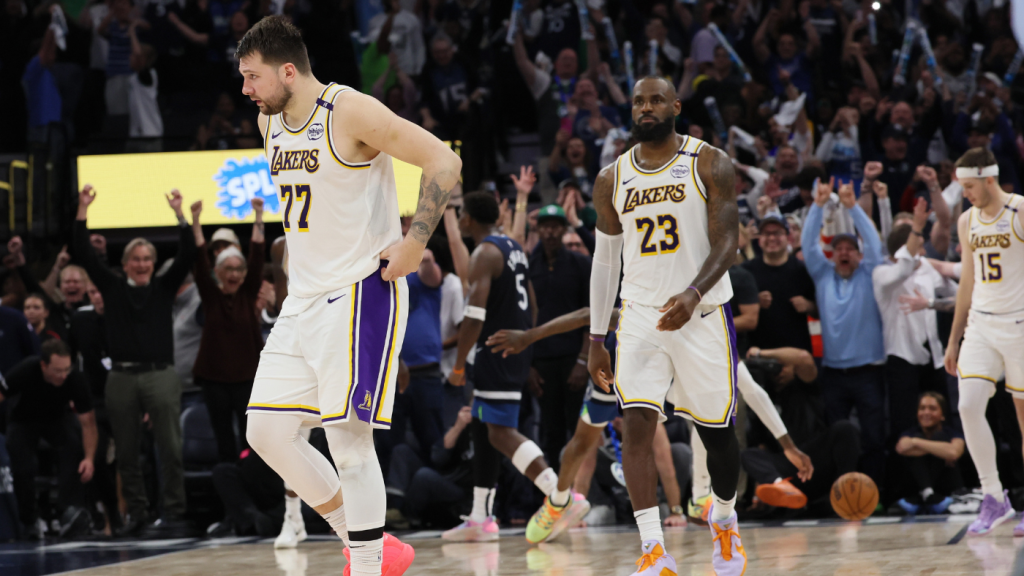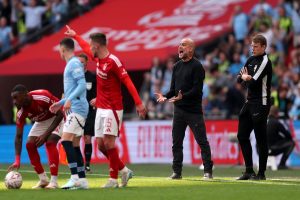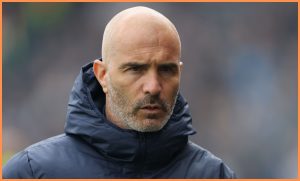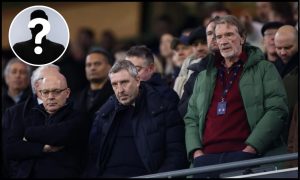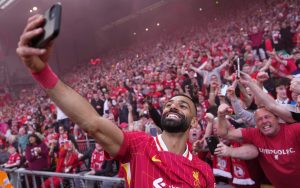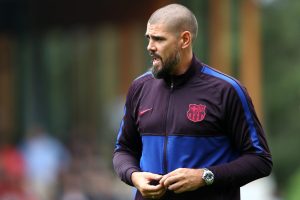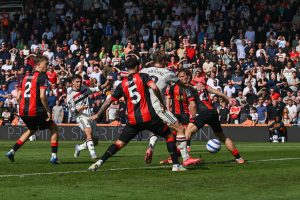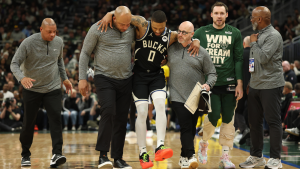JJ Redick felt like he had no choice other than to play the same five players for the entire second half
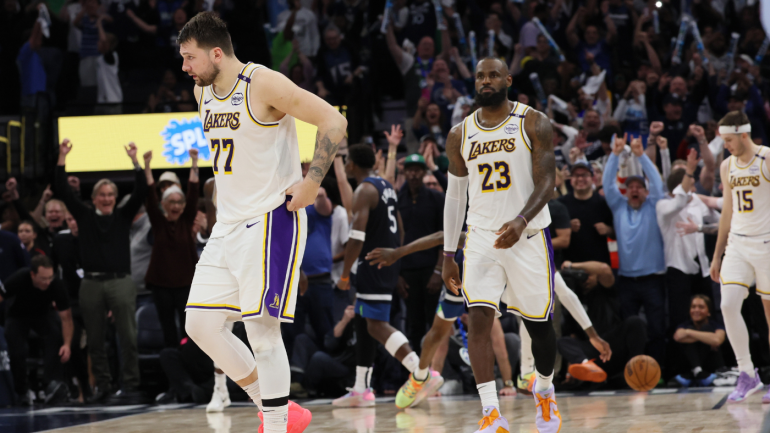
JJ Redick has done everything in his power to squeeze something out of the back half of the Los Angeles Lakers’ roster.
Jaxson Hayes played 26 minutes in the first three games of their first-round series against the Minnesota Timberwolves. The Lakers lost those 26 minutes by 18 points. He still started Game 4. Jordan Goodwin was on a two-way contract a month ago. He still played high-leverage first-half minutes on Sunday when Austin Reaves was in foul trouble. Redick, the Lakers’ first-year coach, has been looking somewhere, anywhere for even the slightest hint of depth or versatility.
But by the midway point of Game 4, Redick had seen enough. LeBron James, Luka Dončić, Rui Hachimura, Austin Reaves and Dorian Finney-Smith. Those five players were on the floor when the second half began. They did not leave it until the game was over.
“It wasn’t the plan,” Redick told reporters. “We just made the decision at halftime.”
Well, we know how it went. The Lakers dominated the third quarter, 36-23. They led by as many as 12 points in the fourth. But their only five reliable players ran out of gas at the end. Dončić, less than 48 hours after playing through Game 3 with a stomach virus, shot 1-of-6 from the floor in that final frame. James, 40 years old and holding the entire defense together practically singlehandedly, didn’t score a single point. As a team, the Lakers made only a single 2-point field goal in the final quarter.
They lost, 116-113, and are now down 3-1 in the series and one defeat away from elimination.
It would be easy to chalk this up to a rookie mistake out of Redick, especially after what happened to Denver on Saturday. The Nuggets, also coached by a rookie in David Adelman, led by 22 points in the fourth quarter of Game 4 of their first-round series against the Clippers. Adelman also leaned almost entirely on his starters, using each of them for at least 42 minutes. And as it did for Redick, it backfired for the Nuggets. The Clippers nearly stole the game on a 32-9 fourth-quarter run. Had the Nuggets lost, Adelman would be hearing the same criticism as Redick.
But Adelman and Redick made that choice because neither of them really had a choice. Their rosters are so thin that playing practically anyone outside of the core has been scoreboard suicide. At least Adelman stole a win with Russell Westbrook coming off of his bench in Game 1. Gabe Vincent is the only Laker outside of the five that finished Game 4 who has even scored in double figures this series. He has 14 points across 73 minutes in four games. The rest of the roster has 20 total points in the series, including garbage time. A lone Hayes dunk was all it provided in Game 4.
Losses like the ones the Lakers just suffered are therefore emblematic of what is becoming a fundamental truth of the pursuit of NBA championships: the regular season may be about strengths, but the playoffs are, emphatically, about weaknesses.
Even with LeBron and Luka, Lakers can’t overcome lack of depth
The Lakers are a team of overwhelming strengths. Being able to put Dončić, James and Reaves on the floor at the same time guarantees a baseline level of offensive success because very few teams have enough perimeter defense to contain all of them. That trio survived on defense without a traditional rim protector due in part to their incredible basketball IQ, but also because of supporting pieces like Finney-Smith, Goodwin and Jarred Vanderbilt who bring extraordinary energy, positional size and speed to the court. On an average Tuesday in March, this team is remarkably imposing.
The equation changes over the course of a seven-game series, in which coaching staffs can pick at every tiny weakness an opponent has. The Lakers’ weaknesses are gaping and numerous.
Vanderbilt and Goodwin, two of the hearts of their regular-season defense, just couldn’t survive offensively in a playoff setting. They can’t shoot 3s, so they aren’t guarded at all, which weakens the shot-creating power of James, Dončić and Reaves because they’re suddenly no longer working one-on-one or able to create advantages for others because they’re playing four-on-five.
Without Vanderbilt and Goodwin surviving offensively, it becomes much harder for Dončić and Reaves to survive defensively. Suddenly, the opponent can go at them one-on-one knowing that there are fewer dangerous helpers waiting behind them. In Game 3, the Timberwolves made a point of targeting Dončić and blowing by him while he was suffering through an illness. In Game 4, the Lakers attempted to hide Reaves off of the ball, but that turned him into the low-man in pick-and-roll, helpless to slow down Minnesota’s scorers when he rotated to the basket. The Timberwolves outscored the Lakers by 18 in the paint in Game 4.
They’ve outscored them by 60 in the paint for the series. They out-rebounded them by eight in Game 4, and that likely swung the outcome. If the fact that the Lakers don’t have a usable center anywhere on the roster isn’t evident yet, note that Dončić had only a single assist in Game 1 and two assists in Game 2. That’s two games with two or fewer assists out of four in this series. He only had two such games out of 50 playoff appearances with the Mavericks.
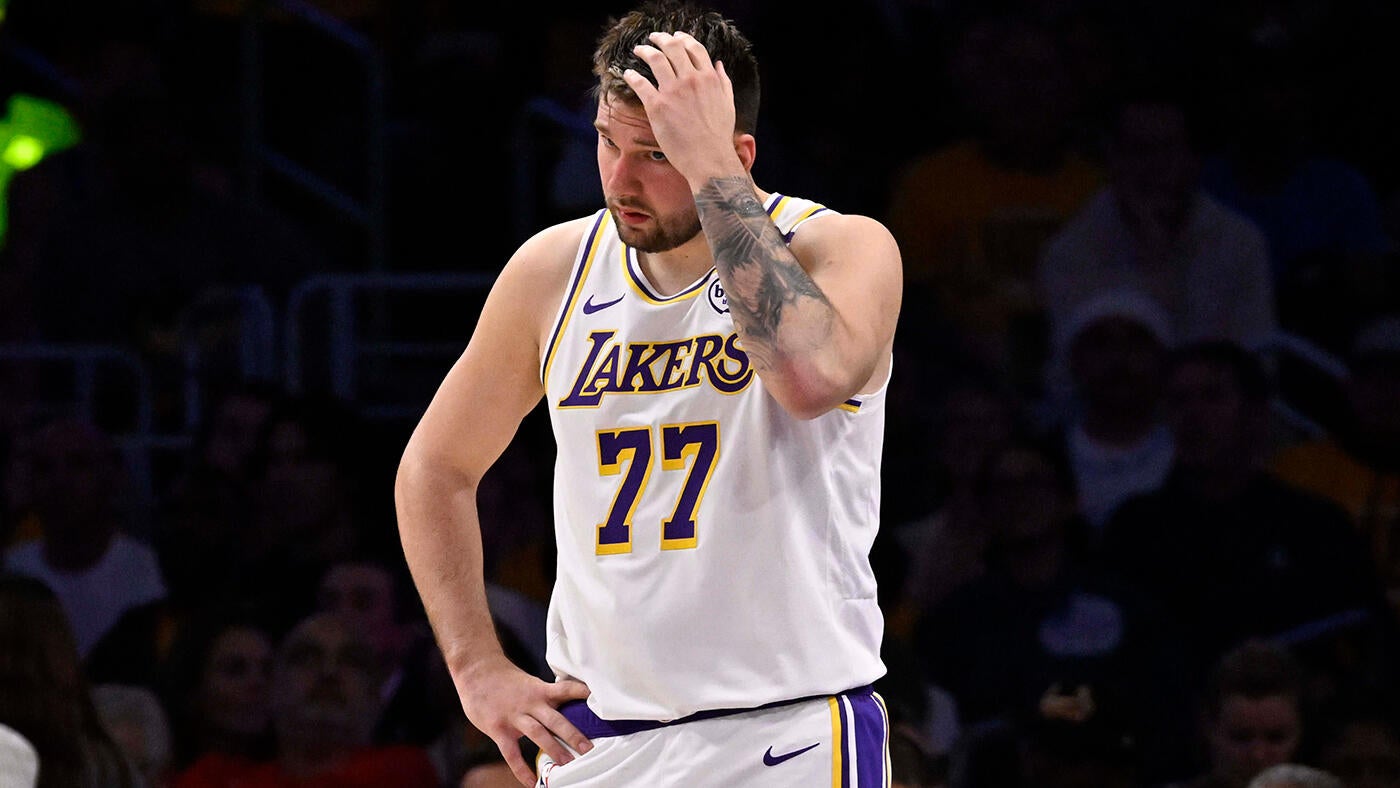
Why? Because the Mavericks always gave him a big man to work with. Dončić had 41 assists in five Western Conference finals games against Minnesota last season, and 22 of them went to centers Daniel Gafford and Dereck Lively II. Of those 22, 10 were lob passes, the most dangerous weapon in Dončić’s arsenal. The Lakers tried desperately to turn Hayes into a receiver for those lobs this season, but he’s simply proven too vulnerable in just about every other area to become that player for Dončić. His hands are poor. His defensive positioning is poor. His basketball IQ is too low. He wouldn’t have seen the floor for a Finals team like the Mavericks a year ago.
The Lakers, in their current state, are not a Finals team. They’ve had no choice but to give Hayes a chance in this series. He hasn’t made the most of it.
Lakers, in their current form, were not designed to win in playoffs
This isn’t exclusively a Lakers problem, though they are the most glaring example of it right now. The Nuggets aren’t far behind. Think of the way that Denver is defending Kris Dunn right now, or the Pistons are defending Josh Hart. These are 33-34% 3-point shooters getting completely ignored, suggesting that in some cases in the playoffs, an offense is only as good as its worst shooter. The Cleveland Cavaliers have admitted that they’ve built an entire offense around torturing Tyler Herro, an All-Star, because he’s so vulnerable in pick-and-roll. Modern playoff basketball is defined by a team’s ability to cover its own weaknesses and exploit the opponent’s. Now think about the favorites in each conference. The Celtics and Thunder are so good, in part, because they have no weaknesses. Everyone shoots. Everyone defends. Enough players do everything else.
The Lakers are on the other end of that spectrum, a surplus of a few key traits but practically an absence of others. That shouldn’t surprise anyone. It’s what happens when you try to build a team on the fly at the trade deadline. The Dončić trade was absolutely the right move for the Lakers in the long run. In the short term, it completely threw off the balance of their roster. They even knew that. It’s why they tried to trade a haul for Mark Williams to be their center. If they’d approved of his physical, maybe this series and even this season as a whole would look different right now.
They didn’t. Whether that proves to be the right or wrong decision down the line remains to be seen. But for right now, this just isn’t a championship-caliber roster. It isn’t close. Sure, the Lakers are a few breaks away from leading this series 3-1… but if you’re playing 50-50 games against Minnesota, how do those odds shift against Oklahoma City? If you can only trust five players in the first round, how many can you trust in the Finals?
These are solvable problems with an offseason to work with. The Lakers are probably going to enter next season with a far deeper and more versatile group of role players. The Dončić trade was never about what happened in 2025. It was always about what came after. Their stellar regular-season run in February and March hinted otherwise, but even if it was accidental, this was a team designed to win in February and March. Now that it’s April, we see just how far away from a championship they really are.
